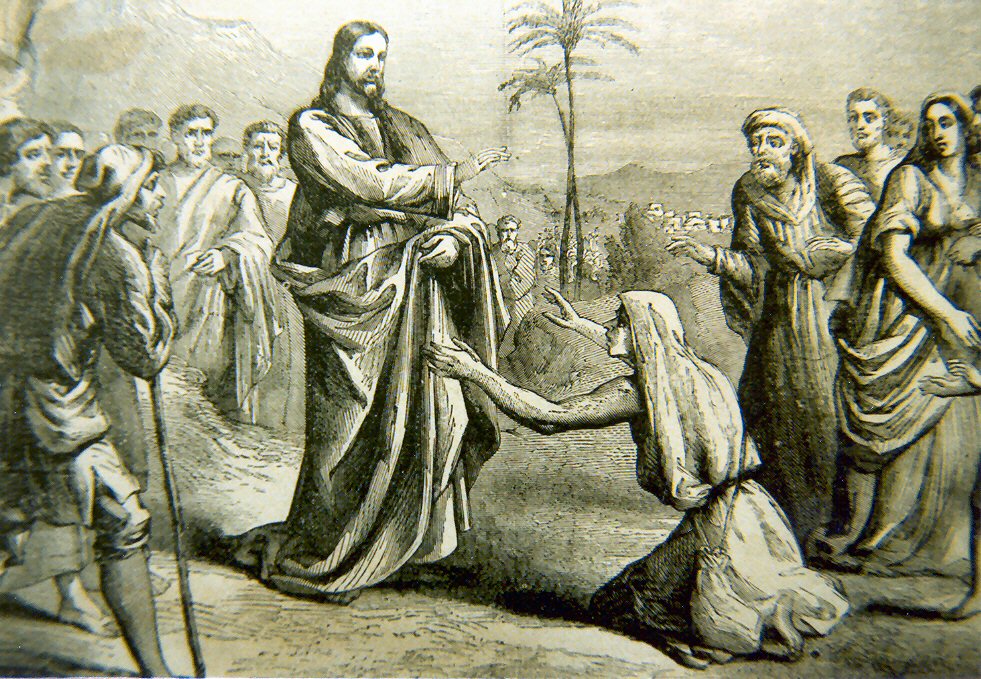
Thanking God
by Rev. Albert F. Ernst, O.S.F.S.

Today’s Gospel speaks about ten men who because of leprosy, were excluded from the society of their fellow men and who, by law, were exiled from their homes. For these men the present had no joy and the future gave no promise. Moreover, as far as the world was concerned they were men with out hope and on the verge of despair. In short, they were ten lepers condemned to a living death.
These ten men, though isolated, have now and then heard about Jesus of Nazareth before whom all manner of disease fled, whom the wind and waves obeyed and who even went into a grave and brought the dead back to life. Oh that these lepers might disregard the law of segregation and with other human beings approach this man for they have heard that He possessed miraculous powers.
Then in some way word is brought to them that Jesus will pass near the place of their exile. Deadened hope revives. They determine to meet Him with an appeal for help. They must appeal to Him for He is their last resort. Hence, standing afar off they lifted their voices and in unison called out, “Jesus, Master, have mercy on us.” Their cry was heard. Goodness and mercy were showered upon them for, on their way to the priest they were made clean. Their leprosy disappeared. What joy must have filled their hearts.
One of them, when he saw that he was made clean, went back and with a loud voice glorified God; he fell on his face before the feet of Jesus and gave thanks. Our Lord was touched by his expression of gratitude. Then affectionately, He uttered these words, “Were not ten made clean? And where are the nine?” Our Lord was hurt because only one person came back. These few words show us that our Lord appreciated the expression of gratitude on the part of the man who was cured. These words also show us that our Lord expected at least a, “Thank you,” from the other nine.
This event very will illustrates what is the conduct of Almighty God towards man and what too frequently is man’s behavior toward God. God is abundant in His goodness, man too often is forgetful of the source of that goodness. In the time of trial, sorrow and want we run to God and ask Him for comfort and assistance. Like the afflicted lepers we cry out, “Jesus, Master, have pity on us.” Our Lord does take pity and the favor we ask is usually granted. And then, once the favor is granted it too often happens that we forget the hand that blesses us and we pass on without saying a word to God.
By acting in this way we again force our Lord to say, “Were not ten made clean? And where are the nine?” Jesus only says what Almighty God may have imagined, as constantly saying, when, from His high throne in heaven, He looked down upon earth recounting the innumerable acts of goodness with which the earth is full and asks where is the return? How few are the acts of thanksgiving which ascend from earth to heaven in comparison with the acts of goodness which descend from heaven to earth.
But why does He value our expression of gratitude? What good does it do to Him? Well, you may value a gift for two reasons. First, for what it’s really worth and secondly on account of the person who gives it. Now, most frequently it is this latter circumstance which adds immensely to the value of any offering. A mother greatly prizes a present which her own little child gives her on her birthday or on a feast day. It is not the intrinsic worth of what is given that is so much valued. The mother probably gave her child the money with which to buy the little treasure. Again, the mother could have bought the little object for herself if she really wanted to. But what she does see in the gift is the love and the heart of her child. These she considers to be beyond any earthly present and which to her is an occasion of such pure joy. So it is with God. He values our offerings of thanksgiving because our heart and love accompany each sincere tribute and expression of gratitude. And it is for human hearts that our Lord is always pleading in His precept of love. To hold back our thanksgiving is to hold back our love and this our good God does not want. I hope that we will not disappoint Him in the future.
In our offering of thanksgiving many acts are applied. Faith is implied for we are acknowledging that God is the source from whence comes every good and perfect gift. Love is implied because we are showing an appreciation for God’s goodness. Hope of future blessing is implied for thanksgiving for past favors is sometimes required as a condition for a continuance of those favors. If we do not thank God for what He has given, He judges that we do not value His gift and he ceases to be so abundant in those signs of His goodness.